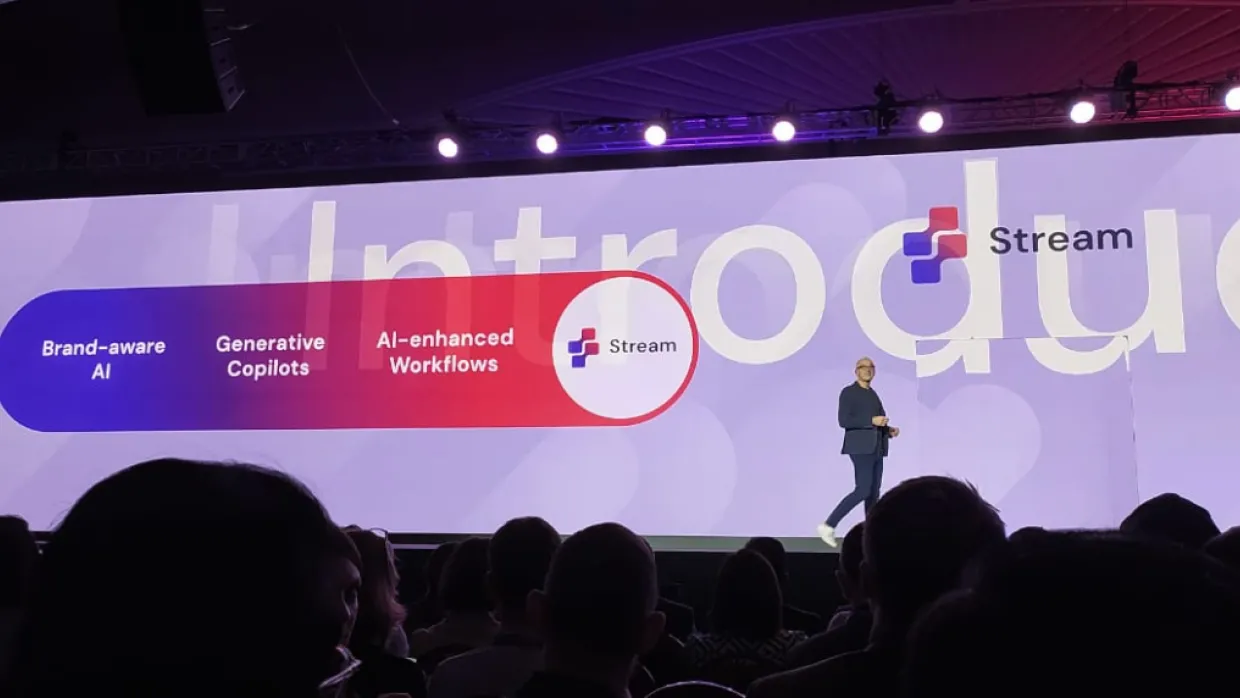AI Agents and Search: The Battle for Brand Visibility

For decades Google has been called the 'front door to the internet,' and position one on page one has been the holy grail for every brand with an online presence.
Sure, as Google has pushed its SEM product harder, that organic result has been pushed further down the page by paid ads. But outside of joining the bidding auction, organic ranking has been the cornerstone of effective search discovery.
Not anymore.
AI-generated answers are fundamentally changing how people find and sort through information, siphoning off traffic that used to flow directly to your site.
Google's AI Overviews, ChatGPT, Gemini, Claude, and Perplexity now answer user questions right at the top of search results or directly within their own apps.
No clicks, no scrolling - just answers. And users love it.
For digital leaders, though, this represents a fundamental challenge. Studies show organic click-through rates dropping by 15–20% when AI answers appear, with some cases seeing declines as steep as 64%.
The new reality is, if your content isn't powering those AI answers, you're not just losing traffic, you’re losing visibility.
This shift is already reshaping how modern DXP platforms like Sitecore’s composable SaaS stack — XM Cloud, CDP, Personalize, Search, and Content Hub — work together to help brands stay discoverable across both AI-driven and traditional search channels.

The Shift To AI Enabled Search
The adoption of generative AI for research, discovery and answers by consumers can only be described as ‘break neck speed’. 43% of consumers now use AI tools daily for discovering, evaluating, and buying from brands, and 75% report increased usage year-over-year. ChatGPT logged over 525.9 million unique monthly visitors and more than 800 million weekly users in March 2025, making it the most widely used consumer AI tool globally.
Your customers aren't typing queries into search boxes the way they used to, they're having conversations with trusted chatbots instead. Those chatbots are curating the web's knowledge into single, synthesised answers without necessarily sending anyone to your site.
Does this mean years of investment in traditional SEO is wasted? No, not necessarily, but it will become less effective if AI tools don't see your content as authoritative or worth citing.
This isn't about abandoning SEO, it's about evolving it for an AI-mediated world.
Gemini in Chrome: Total Takeover Imminent
Google’s latest move makes this shift impossible to ignore. In September 2025, Gemini AI was announced as a native feature within Chrome. AI is no longer confined to search result pages—it’s now embedded as a constant companion inside the browser itself.
With a single click on the Gemini icon, users can summarise any page, compare information across multiple tabs, and soon even complete tasks like booking appointments or making purchases. The browser is evolving into an intelligent agent that actively works on the user’s behalf.
Given Chrome’s dominance—71% of desktop and 66% of mobile browsing—this represents a fundamental shift in how people search, discover, and interact online.
For businesses, the implications are stark: your webpages will increasingly be filtered, summarised, and judged by AI before a human ever sees them. Content that is vague, thin, or padded with generic marketing language risks being ignored or misinterpreted. But content that is clear, substantive, and rich with genuine insight has a far better chance of being surfaced accurately—and of driving users to your site when they want to go deeper or take an action.

What AI Tools Actually Want From Your Content
AI search tools aren't conjuring answers from thin air. They rely heavily on existing web content to generate their responses. This means the quality and depth of your content directly determines whether you appear in AI-driven results.
Early evidence from people experimenting with this new landscape shows that AI strongly favors content that's comprehensive, specific and context-rich. One content creator found that when they produced "comprehensive content that covers every angle, ina strauctured fashion" of a topic, ChatGPT and Perplexity started citing their pages without any traditional SEO manipulation or even backlinks.
This is exactly why Sitecore’s composable SaaS stack emphasises structured content models, semantic fields, and atomic content reuse as first-class capabilities.
The insight: AI loves context, so you need to think like an encyclopedia helping a reader solve a problem, not a business publishing a blog post.
So, what makes content attractive to AI tools?
Depth over surface-level content. Thoroughly explore topics instead of just skimming the highlights. AI models are trained on vast amounts of text, and they generate better answers when they have in-depth, well-structured source material to draw from.
Structure and clarity matter. Use clear headers, well-crafted FAQ sections, and direct question-and-answer formats. AI tools effectively scan for these structures that indicate "this section answers that specific query."
Implement structured data with schema markup. Schema.org markup helps AI tools and LLMs understand exactly what your content is about. By tagging elements like articles, FAQs, how-tos, products, and reviews with schema, you're essentially providing a readable blueprint that AI can easily parse and reference. This structured data makes it exponentially easier for AI web search tools to find, interpret, and cite your content during both real-time searches and the training processes that build these models.
Create role-specific content. Address different audience segments explicitly. If an executive searches for data analytics solutions, AI might present different answers for a CFO versus a CMO, pulling from content that speaks to each perspective.
Keep content fresh and factual. If your blog posts haven't been updated in years, AI tools will consider them less reliable. Regular updates with current data and insights signal that your site is an up-to-date source.
If your content reads like generic marketing fluff, AI has little reason to include it. Content that reads like a definitive source, with clear explanations, relevant statistics, and original insights, is your path to being included in AI-generated answers.
How to Get Discovered: A Practical Research Approach
You need more targeted content, but where do you start? AI tools themselves can serve as research assistants.
Here’s your strategic approach:
Start with your customers' real questions. Gather input from sales, customer support, and product teams. What questions come up repeatedly? What decisions are customers trying to make? Think in terms of natural language: "How do I reduce integration costs?" or "What's the best implementation approach for mid-size businesses?"
Query AI search engines directly. Take those questions and pose them to tools like Perplexity or ChatGPT. Observe what answers they give and, critically, what sources they cite. Are competitors being referenced while you're absent? That reveals a content gap you need to fill.
Mine the follow-up questions. Tools like Perplexity suggest related questions after answering your initial query. These suggestions are gold for content planning. They reveal what users naturally ask next, helping you map out entire content clusters around your main topics.
Identify gaps in the AI's answers. Read the responses critically. Is the AI missing an important nuance that you know about? Perhaps the summary is generic and doesn't include a perspective that an expert from your team could provide, or an angle that a more specific audience type might benefit from. Those gaps represent opportunities to create content that adds real value beyond what's already available.
Inject what only you can provide. Include case studies from your actual projects, quotes from internal subject matter experts, or proprietary data. This expert and experiential content makes your work uniquely valuable, something AI can't synthesise on its own.

Scale Your Efforts With AI-Powered Tools
Producing comprehensive, well-structured content at the volume AI search tools demand can feel daunting for already stretched marketing teams. This is where generative AI integrations inside CMS and DXPs—like Sitecore Stream—shift from a “nice-to-have” to a “critical enabler.”
Sitecore Stream isn’t just a content generator. It’s a brand-trained copilot that can scale production while aligning to the principles that make content attractive to AI systems in the first place:
Context-rich first drafts: By training it on your brand guidelines, tone of voice, product knowledge, and approved assets, Stream can draft content that’s already structured and comprehensive, giving you a head start on the depth AI tools reward.
Audience-specific variations: Whether you need landing page headlines crafted for CFOs, FAQs tailored for healthcare buyers, or product descriptions localized for different regions, Stream can quickly produce role- and segment-specific drafts. This precision mirrors the way AI search tools deliver differentiated answers depending on the query context.
Built-in structure for AI readability: Stream can generate content in formats AI tools prefer, reducing the manual lift for your team while increasing your likelihood of being cited in AI summaries.
Freshness at scale: Instead of struggling to update outdated pages, teams can use Stream to rapidly refresh existing content with new data, examples, and expert insights—signals AI Overviews weigh heavily when judging reliability.
The key is not to treat AI as a substitute for expertise but as a scaling mechanism. Your team still injects the unique insights, case studies, and proprietary data that make your content authoritative. Stream accelerates the production of structured, brand-consistent material—giving you the time and capacity to add the depth and originality that AI discoverability now demands.
This means faster time-to-market, lower production costs, and content that isn’t just on-brand, but also positioned to be surfaced—and trusted—by the next generation of AI-driven search and discovery.
The Time to Act is Now
The search landscape isn't shifting gradually, it's moving fast. You’ve probably already noticed your own organic traffic declining already. Meanwhile, your competitors who’ve embraced AI-ready content strategies are winning citations in AI outputs, even when they have lower traditional SEO rankings.
The three things successful digital leaders are doing right now:
Doubling down on content quality. They're ensuring every important question in their industry has a clear, authoritative answer published on their properties.
Tracking metrics. Getting cited as a source by an AI tool might be just as valuable as earning a click. Forward-thinking teams are monitoring not just SEO rankings but also AI citations and attributions as new forms of ROI.
Leveraging available technology. Whether it's Sitecore Stream or another AI content platform, they're using tools that help scale content production (led by strategic research) without sacrificing quality or brand integrity.
Most importantly, they're staying focused on audience needs. When you create genuinely useful, specific content that helps your customers, whether they read it directly on your site or encounter it summarised through an AI assistant, you build trust, affinity and eventually drive meaningful engagement.
The battle for visibility is already underway.
It's being fought in AI overviews, chatbots, and browser assistants. Digital leaders who retool their content strategy now, equip their teams with AI-driven capabilities, and prioritise user-focused content will keep their brands visible and relevant.
Those who wait may find their digital presence quietly fades from the conversation, not because their products fell out of favour, but because their content wasn't optimised for how people actually find information today.
The time to future-proof your visibility is now.
If staying discoverable in an AI-first world is on your mind, let’s start the conversation. We’ll work with you to shape a practical plan that keeps your brand present—and competitive—where your customers are now searching.
Thanks for reading,
Troy Muir
Digital Strategy Director

Curious about what this means for your brand? Let’s chat about how Aceik can help you stay ahead.